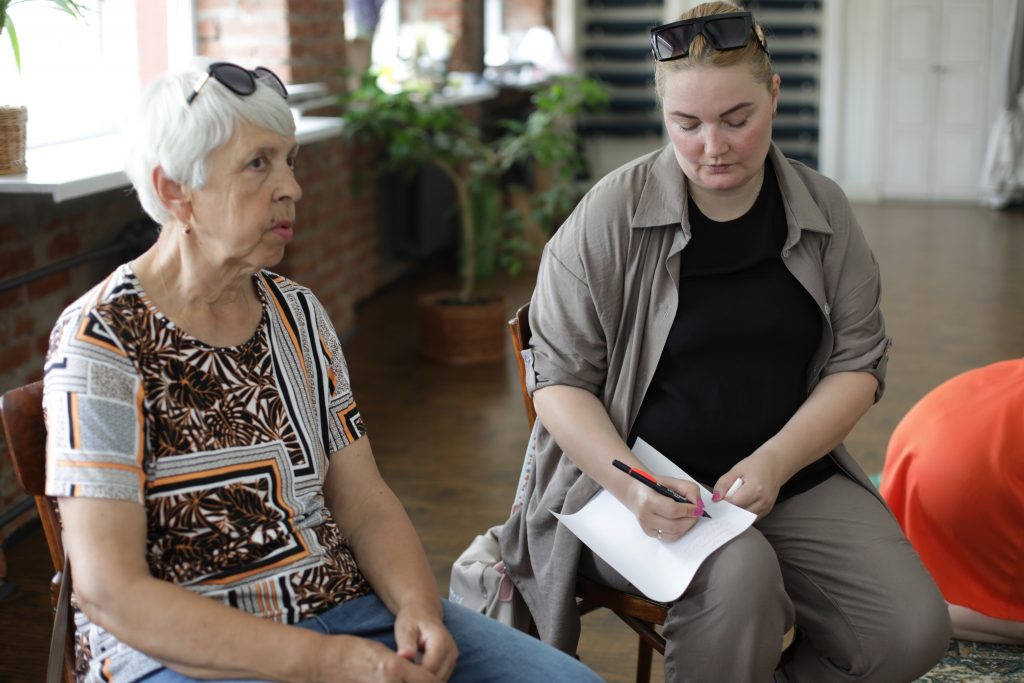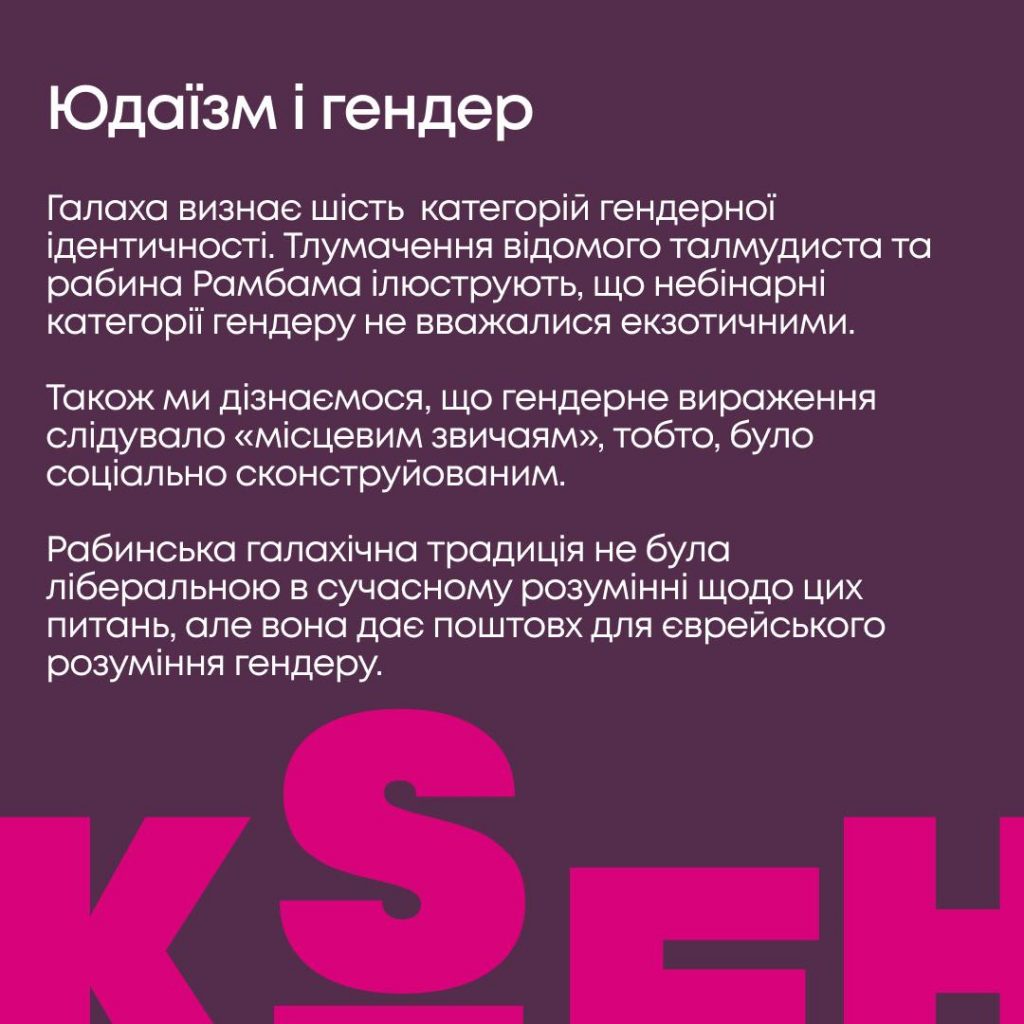Three ways to research your roots
Tetiana Hetsilevych, program director of Project Kesher Ukraine, talks about the importance of connecting with ancestors and how the organization tries to bring Ukrainian Jewry to the Ukrainian language.
Yelyzaveta Tsarehradska: Our conversation is one of the few times when I can say that I love social networks. I saw a video on your project's Instagram account with instructions on how to learn about your roots and found it very engaging. Why is it essential for Jews to know their roots?
Tetiana Hetsilevych: Thank you for the question. We are also delighted that the efforts of our team and the topics we choose resonate with the audience, and we will work on it even harder.
Returning to the Torah
Tetiana Hetsilevych: So, it is vital for us, Jews, to search for, preserve, and learn about our roots. Why? First, the answer is on the surface because the fifth commandment in the Torah says, "Honor your father and mother."
For religious Jews, this is the most fundamental thing. However, it is different for the audience of Project Kesher Ukraine. We are not a religious organization, and we view searching for our roots from several angles. Each direction is important to us in its own way. For example, extending this idea about the importance of roots, we have offered our audience a project called "Returning the Torah home" for many years now.
You know that it was impossible to openly read the Torah in Soviet times. Since Ukraine became independent in 1991, many Jewish communities began to be restored on its territory. Project Kesher Ukraine became one of the few organizations that provided an opportunity to communities whose members wanted to study, read the Torah, and learn about their roots.
This opportunity is quite valuable, both literally and figuratively. And this is huge, because if there is no Torah, there is nothing for the community to gather around.
Project Kesher Ukraine was able to deliver more than 10 Torahs to the Jewish communities in Ukraine, thus enabling them to fulfill one of the main commandments.
"You live as long as you are remembered"
The importance of studying Jewish roots is also an opportunity to reconstruct family history. We can learn something about one generation or another and then put together the complete genealogy as if drawing a picture. Only then do we learn about those everyday historical, traditional things our ancestors admired.
You may have heard this joke: all Jews are relatives. When we get close or make friends, it is crucial for us to understand where a person comes from and whether we actually have something in common in our family trees.
Another important idea in studying Jewish roots is that you live as long as you are remembered. The more relatives we discover in the family tree by searching for them, the longer we remember them and their good deeds in our generation.
Stemming from this is another valuable tradition: we name children after our grandparents or great-grandparents. An important condition is that this child will be able to take all the positive things of the soul of their ancestor who lived on this earth. We also believe that studying one's roots is essential because it helps preserve identity and culture.
"We try to bring Ukrainian Jewry to the Ukrainian language"
Project Kesher Ukraine is currently paying a lot of attention to these things. We are trying to bring Ukrainian Jewry to the Ukrainian language. There is an opinion that after the Soviet era and while Ukraine was establishing its independence, Russian was imposed as the language of Ukrainian Jewry.
We want to establish that historical, traditional moments are in Ukrainian, so at our events and on our website, you can see quite a sizeable collection of the main prayers in Ukrainian. We published the first Ukrainian-language translation of the Haggadah on the website haggadot.com. This is a book dedicated to the rituals of Pesach celebration. We produce Ukrainian-language guides for celebrating Jewish holidays and other important dates. We believe that all this is extremely important. It's like a story of searching for our roots and its reflection in modern times.
1. Genetic testing
Yelyzaveta Tsarehradska: I think what you said can be applied to any nation and person regardless of origin. I don't know why, but just a few people in my milieu can clearly name their ancestors up to at least the fourth generation and tell me what they did. If I understand correctly, this is what is important for Jews, and they know, share, and pass on all these stories. So, is this a more common practice among Jews than in my example?
Tetiana Hetsilevych: Your understanding is quite correct. It is indeed crucial for us. From my own experience, the parents or the older generations try to tell children growing up in a Jewish family as much as possible. For example, I remember I was probably five when my father first took a piece of paper and started drawing a family tree. I was intrigued. Of course, I did not remember all the generations the first time. I was interested in this at the age of five, and I am still keen on it today. Just last week, I ordered a genetic test from MyHeritage to dive deeper than the generations I already know.
Yelyzaveta Tsarehradska: And how many generations do you know if that's OK to ask?
Tetiana Hetsilevych: Sure, that's fine. It's all very individual. Talking about my family, I know for sure about my great-grandparents. It's the 1920s, but I want to go deeper.
2. Talking to relatives
Yelyzaveta Tsarehradska: Let's move on to the practical part. The question here is, how do you research? It's good to have parents or grandparents who can tell you, draw a family tree, and pass on all this knowledge. What do you do if that's not the case?
Tetiana Hetsilevych: Let me just add a bit about the situation when you have someone you can approach with these questions. Project Kesher Ukraine offers a very warm, refreshing workshop called "Lador vodor" (from Hebrew, "Strength of Generations"). Mothers and their teenage daughters can talk there about the traditions we pass on from generation to generation. This workshop allows these two generations to implement Jewish values, such as transforming the world by personal example.
If you can't turn to, for example, relatives, parents, grandparents or older relatives, there are also other options. For example, you can have a genetic test made, as I mentioned earlier. I won't advertise any companies now, but, in principle, there are enough offers to choose from on the market now. The only thing is that, from the experience of activists who make up the network of Project Kesher Ukraine, it's better to order a test like that abroad for the time being.
The results can be very interesting not only in terms of ethnic proportions present in every person but also in the way we understand it in the self-identification project. This is the only way we can understand who we are, where we come from, and that we are a multifaceted, rather than one-dimensional, individual. And this is extremely important to us.
Learning about our roots via genetic testing can sometimes help us engage in networking, i.e., find connections in our community. So, this option should not be overlooked.

3. Electronic databases
In addition to genetic testing, there are electronic databases that can provide information about your ancestors, but you need to have the data first, i.e., the name, patronymic, place of birth, or place of burial.
There are several such electronic databases. You may have heard about one of them in our video message on social networks — FamilySearch. There is also a vast database run by JewishGen and Yad Vashem. Incidentally, Yad Vashem recently introduced a Ukrainian-language tour, which we are pleased about. There is also Lipes database, a fairly large database focused on Jews who lived in the territory of modern Ukraine.
To sum up, there are three ways of researching your roots: asking your relatives, getting a genetic test done, or searching in various electronic databases.
Yelyzaveta Tsarehradska: Is there any way to retrieve information about those killed in the Second World War? Are there any sources, such as execution lists?
Tetiana Hetsilevych: It makes sense to refer to any sources where you might find a mention, signature, or at least something. In principle, this line of activity is mainly associated with archivists, genealogists, and historians — those who do this every day. Personally, I know quite a bit about the ancestors on my mother's side, while my information goes back only to around the 1920s on my father's side. In my case, the records were found in Kremenchuk, and it's a good thing there was something preserved in the archives there. But there is nothing before the 1920s. However, it is worth searching not only among official records but also in any letters, death notices, etc. That is, you can search everywhere.
However, judging from my experience, many people will need help. For example, you need to know how to formulate a request for archival data, even though they now accept requests in electronic form and operate electronic databases. Usually, when we request information about a person and indicate their date of birth, the archive looks at the two adjacent years around the date we indicated. And it's cool. It's like our guarantee that there will be the answer we're waiting for, but if there is none, it doesn't mean there's no information in the archive.
The name could be written a little differently because the transliteration was very inconsistent, and names were changed to conceal identity during Soviet times. Therefore, it is worth searching for information, but you need to either prepare very well on your own or ask for help. There are people in the network of Project Kesher Ukraine that we can recommend, but this is not the main activity we are engaged in.
Other activities of Project Kesher Ukraine
Yelyzaveta Tsarehradska: What projects are you currently implementing or intend to implement?
Tetiana Hetsilevych: A series of Jewish holidays begins in September. On 9-10 September, we invite you to Lviv for a Jewish weekend. There will be an opportunity to talk personally with many activists working on Ukrainian-Jewish relations in culture and discuss various topics, including genealogy. That's what the next event is about.
In general, with the start of hostilities on the territory of Ukraine, our activities changed a little, of course. We had to put some projects on hold, but many others are active, and we are working on launching a grand project for women.
Today, I can say that we have a project to help pregnant women and young mothers. We help them emotionally and psychologically. We also provide humanitarian assistance whenever we can and operate a support chat where women receive assistance daily.
We are working on a big project for women aged over 40. You will soon be able to read about it on our social networks, and it will include support because we receive requests for it and want to respond. Regarding Jewish communities, we always provide support during holidays until a certain date, and we also work on preserving and popularizing Ukrainian-Jewish relations.
We have a section on mutual influences between Ukrainian and Yiddish, Hebrew. We are working on Ukrainian-language materials and translations of prayers and other texts. We also help and remind women to take care of their health. We have experts, guidelines, and informational support regarding women's health. We engage many specialists, and the program runs all year long. We are open and always on the side of informational and emotional support and being in touch. A series of events to promote sports for women's health is currently taking place in Ukraine. Such events have already been held in Kyiv, Vinnytsia, Odesa, and Kharkiv.
We also conduct art practices for women, where they can meet with an art therapist, relax, get to know each other, receive support, and join the network of activists of Project Kesher Ukraine. We always have something interesting going on. For example, online yoga classes for various categories of women: pregnant women, recovering women, and grown-up girls, as we say.
Judaism and Gender
The Halakhah recognizes six categories of gender identity. The interpretations of the famous Talmudist and Rabbi Rambam illustrate that non-binary categories of gender were not considered exotic.
We also learn that gender expression followed "local customs," i.e., it was socially constructed.
The rabbinic halachic tradition was not liberal on these issues in the modern sense, but it provides an impetus for the Jewish understanding of gender.
Project Kesher Ukraine is a national Ukrainian Jewish women's civic organization that supports female entrepreneurs, promotes gender equality, and encourages Jewish women to preserve their people's traditions and pass them on to the next generation. The project helps interested representatives of other religions and cultures acquaint themselves with Jewish culture. "Kesher" means "connection" in Hebrew.
Vlada Nedak, executive director of Project Kesher Ukraine, has appeared in Hromadske programs multiple times. As part of the 16 Days of Activism for No Violence Campaign, Nedak and other experts talked about how violence could be recognized and what everyone could do to counteract it.
This transcript has been edited for length and clarity.
This program is created with the support of Ukrainian Jewish Encounter (UJE), a Canadian charitable non-profit organization.
Originally appeared in Ukrainian (Hromadske Radio podcast) here.
Translated from the Ukrainian by Vasyl Starko.
NOTE: UJE does not necessarily endorse opinions expressed in articles and other materials published on its website and social media pages. Such materials are posted to promote discussion related to Ukrainian-Jewish interactions and relations. The website and social media pages will be places of information that reflect varied viewpoints.





















